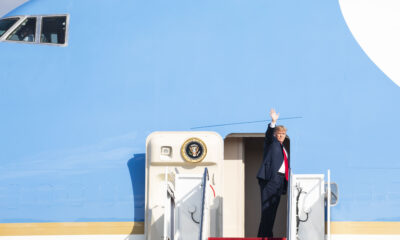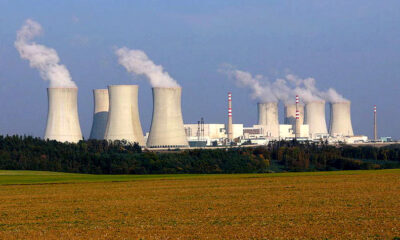Entertainment Today
Communism: the Star Trek economy

Fifty years ago next month, Star Trek had its premiere. That people still talk about it today, testifies to its phenomenal success. But many, perhaps most, who follow the show never thought about the economic system that supported “Star Fleet.” Key lines of dialog give evidence of one system only: communism.
The economy of Star Trek
The economy of United Earth (actually Earth under an all-governing United Nations) shows all the marks of pure communism. Humanity shares this communism with the other member societies of the United Federation of Planets. Neither the Federation nor any member world issues currency, whether coin or scrip. Imagine a society with neither central bank nor any other kind of bank. Only one kind of society can get along without currency or even a unit of exchange: communism.
The UN (and the Federation) do not have a Ministry/Department of Global/Interstellar Security. Or at least, not like the old KGB.1 If the UN had such an agency, it would most strongly resemble the former Soviet Union.
Planning boards
Both the UN and the UFP likely have Planning Boards, similar to the old Soviet Gosplan. Surely these Planning Boards draw up input-output matrices for their respective societies. True, no character ever referred to a Five Year Plan. But as any economist knows, input-output analysis replaces pricing for setting production levels under communism.
Did the producers and writers think all this through? Not at first. Gene Roddenberry and his team never had USS Enterprise NCC-1701 return to Earth on any errand. But their successors did.
Earth is too perfect
In The Next Generation, Captain Jean-Luc Picard returns to the vineyard his family have owned for generations.2 Voyager had an officer returning to ultra-modern Marseilles—an immaculately, and impossibly, clean city.3 In Deep Space Nine, Captain Benjamin L. Sisko’s father runs a creole restaurant in New Orleans.4
In the only crime that takes place in any of these three scenarios, a terrorist tries to assassinate Captain Sisko.5 Other than that, human society sees no violent crime. The closest Star Trek comes to a regular human criminal is Harcourt Fenton “Harry” Mudd.6 And he commits, not murder or robbery or even burglary, but fraud. He also commits it on the margins of Federal space or against non-human governments. Aside from such tricksters (or the Orion Syndicate), complacent humanity need fear only an external attack.
Rise of communism
The shows Deep Space Nine and Enterprise described the rise of communism on Earth in detail. Of course they do not call it communism. They call it “The New Economy.” In this economy—with rare exception—the government educates you, employs you, feeds you, and assigns you shelter. They build all apartment, commercial, and office buildings, and factories. The exceptional private employers include nostalgic restaurateurs, generational vintners, and the like. The government will let anyone produce specialty goods or services as a creative outlet. But for all other goods and services, the government provides.
Generous allowances
Why do people put up with this? Communism allows no rights. Communism allows goods and services, as government planners see fit. And in the Star Trek civilian world, the government makes incredibly generous allowances. Single-payer medical care? How about free medical care. And all sorts of free stuff, from cradle to grave.
Especially in the latter days of these chronicles (The Next Generation, Deep Space Nine, and Voyager), no one shops! Every apartment has its consumer-grade “replicator.” A tenant says to this machine, “I want a ham sandwich,” and gets it—within seconds.
Replacing heavy industry
This “replicator technology” also works on an industrial scale. Even Captain Kirk hints at this abundance. In one episode,7 two alien campers on a deserted planet try to tempt Kirk and his officers with precious stones and metals. “We run these things off by the ton!” Kirk says, half in amusement. In a later film,8 Captain Picard drops a clearer hint. He says, “Our society has evolved far beyond considerations like cost and price.” Of course. Communism does not know these things.
Exceptions exist—at the margins of Federation space. In Deep Space Nine, a character complains that industrial replicators are difficult to build. Thus the Federation faces an ethical riddle when allocating them. A world starting to recover from a half century of hostile occupation, seemingly must wait its turn. But the Federation proper does not have such a problem.
The government shall provide
Who provides this bounty? To quote Ayn Rand:9 “An industrialist – blank-out – there is no such person.” So the government provides everything. All this accords with the basic theory of communism. Communism vests in the government the full responsibility, and sole authority, not only for managing physical force, but also for providing for “needs.” If a private business exists to furnish any service other than a diversion, the communist complains. Says he: The government has outsourced its core function and is thus derelict in duty.
Limited trade
Does any trade take place at all? Yes—between unified societies. The government runs all agriculture (except for specialties like vine-dressing), mining, and manufacturing. The few characters who have run businesses in private-public partnership with the UN, are either traitors10, or “in thick” with an interstellar criminal syndicate11. Long-haul freight carrying does remain a private venture—for awhile. In those days, a freighter captain and his family live aboard and function as a crew. As the history of the Federation progresses, Star Fleet takes over more and more long-haul freight routes.12 Only at the margins of Federation space do long-haul freighters do any private business at all. (Captain Benjamin L. Sisko’s love interest, Kasidy Yates, has just such a career.)
Canonical details
The Star Trek canon gives more than a description of a New Economy. In one episode of the last show (Enterprise), Captain Jonathan Archer and his crew return to 1944 Earth. Except this time, Nazi Germany have conquered Europe, Africa, and part of the American Eastern Seaboard.13 How could they have done it? One character gives this answer: in 1916, some time-traveling intervenor assassinated Vladimir I. Lenin. The Bolsheviks never took power. If Tsar Nicholas II fell from power, Aleksandr Kerenskiy kept it. Russia never embraced communism. So Adolf Hitler never regarded Russia as a threat. And he could drive westward, with no Josef Stalin to threaten his rear.
Rules of Acquisition
If that evidence does not suffice, perhaps this will. Star Trek always thrived on adversarial relations, war risk, and in some cases actual warfare. So the Federation needs enemies. As the worst enemies (other than the Changeling Dominion), the producers created the Ferengi Alliance. These Ferengi sported snaggle teeth, oversized ears, short stature, and high-pitched, tinny voices. Their world suffered near-constant rainfall. And their society advertised itself as capitalistic.
A typical Ferengi would parody every defense of free enterprise anyone might have heard. In fact, when they did not behave like thieves and pirates, they behaved like the worst businessmen imaginable. The “bias suffix” -men appears here on purpose. Ferengi law did not let a woman go into business for herself. Ferengi custom did not even let women put clothes on in public!
Roger Ailes recently resigned as President of Fox News. Gretchen Carlson, Megyn Kelly, Andrea Tantaros, et altae accuse him of offenses that should disgust anyone. If he has committed half those offenses, then he would be the perfect Ferengi businessman. Grace Lee Whitney’s executive assailant would also fit well into Ferengi society.
A travesty of capitalism
Ferengi live by a set of “Rules of Acquisition,” 285 cynical precepts that teach grasping for anything in the here-and-now.14 Let the buyer beware. Those Rules flatly encourage their followers to lie, cheat and steal. They also are a travesty of capitalist business precepts.
Obviously Ferengi society does not portray capitalism accurately. In fact that society cannot even work for five years, much less five hundred. Lie to, cheat, or steal from enough people, and other people won’t do business with you anymore. But you will not find that among the Rules of Acquisition.
“Reform”: art anticipates life
The show Deep Space Nine developed the Ferengi thread more than any other. Here the writers spun a plot thread involving a thoroughgoing reform of Ferengi society. How that reform came about, speaks volumes. The Grand Nagus of the Alliance—the Tycoon-in-chief—prepares to retire. He appoints a no-account person, who has never succeeded in business, to succeed him. (At least Barack Obama is better looking. He has the lobes but not the snaggle teeth. And his singing might not make the dogs howl, as a Ferengi’s singing does.)
He entrusts that person with his reform program. Among its hallmarks: the first progressive income-tax code. We can now see the income tax as an intermediate step. First, systematically remove private wealth. Next, move to The New Economy: communism. The brother of the new chief executive vows to fight the reforms to the end. And viewers laugh at him.
Hard reality
In real life, the Soviet Union collapsed for a reason. The Republic of Venezuela will collapse today for that same reason. Already people crash the border to get their daily bread! Will Durant observed that communism, while it helped men cope with poverty, “did not lift men out of that poverty.”15 In both countries, the government promised to provide everything. And failed miserably, and tragically.
United Earth does not succumb to famine. To avoid famine, United Earth must cheat. So the United Earth Space Probe Agency, the precursor to the Star Fleet Armed Services, “scores” the technologies of replicators and holographic simulations from other societies. This of course begs the question: how did those societies develop those technologies in a collectivistic economy?
New Communist Man
Perhaps Star Trek assumes more than the inherent workability of communism. Certainly it assumes its equivalency to capitalism for producing goods and services. But perhaps the producers also assumed (and did not explain) that humans created New Communist Man. (Likewise, one can assume the creation of New Communist Vulcan, Andorian, and Tellarite, also.) New Communist Man simply assumes the government will take care of him. And he assumes he will have his reward, merely in enhanced economic security, if he “does his part.” New Communist Man does not kill, rape, rob, or assail anyone. He therefore need not fear anyone doing this to him.
Viktor I. Belenko, of the Soviet Army Strategic Rocket Forces, defected with his aircraft on 6 September 1976. In his memoir, MiG Pilot, he described in blistering detail the running joke of New Communist Man. Neither Gene Roddenberry, Rick Berman, Brannon Braga, nor Manuel Coto ever had a countervailing argument to this. Certainly none of their protagonists ever gave it. For they are all New Communist Men (and women). Communism matters as much to Star Trek as does warp drive and transporters.
Endnotes
1The one reference to “Federation Security” in The Search for Spock denotes an agency for keeping State secrets. It does not denote persecution of dissidents.
2“Family” in The Next Generation
3“Non Sequitur” in Voyager
4“Homefront,” “Paradise Lost,” “Image in the Sand” and “Shadows and Symbols” in Deep Space Nine
5“Image in the Sand” in Deep Space Nine
6“Mudd’s Women” and “I, Mudd” in the original series, and “Mudd’s Passion” in the animated series
7“Catspaw” in the original series
8First Contact
9Atlas Shrugged, and specifically John Galt’s three-hour pirate-radio/TV speech
10See, for example, “Demons” and “Terra Prime” in Enterprise.
11The Orion Syndicate. See “The Cage” in the original series. See also “Bound” in Enterprise, and “Honor Among Thieves” and “Prodigal Daughter” in Deep Space Nine.
12The Star Fleet Technical Manual clearly showed rough blueprints of a class of “warp tug” ships. These could pull a passenger-liner module or any of four freight module types. Beyond that, at least two aspiring cadets receive transport orders—on naval vessels.
13“Storm Front” in Enterprise
14Canonical references to these Rules abound. For a complete list of the Rules and their show references, see “Rules of Acquisition,” Memory Alpha Wikia.
15Durant W. The Story of Civilization: Our Oriental Heritage. New York: Simon and Schuster, 1934, p. 18.
Terry A. Hurlbut has been a student of politics, philosophy, and science for more than 35 years. He is a graduate of Yale College and has served as a physician-level laboratory administrator in a 250-bed community hospital. He also is a serious student of the Bible, is conversant in its two primary original languages, and has followed the creation-science movement closely since 1993.
-

 Accountability2 days ago
Accountability2 days agoWaste of the Day: Principal Bought Lobster with School Funds
-

 Constitution2 days ago
Constitution2 days agoTrump, Canada, and the Constitutional Problem Beneath the Bridge
-

 Executive22 hours ago
Executive22 hours agoHow Relaxed COVID-Era Rules Fueled Minnesota’s Biggest Scam
-

 Civilization21 hours ago
Civilization21 hours agoThe End of Purple States and Competitive Districts
-

 Civilization4 days ago
Civilization4 days agoThe devil is in the details
-

 Executive4 days ago
Executive4 days agoTwo New Books Bash Covid Failures
-

 Civilization4 days ago
Civilization4 days agoThe Conundrum of President Donald J. Trump
-

 Executive4 days ago
Executive4 days agoThe Israeli Lesson Democrats Ignore at Their Peril













The Star Trek scripts are filled with “Star Fleet Elite” corruption plots. The centralized command was often the antagonist and the “local” control ship captain was the hero that foiled the corruption. Once that local power was removed, everyone was put in peril of the Star Fleet elites’ arrogance.
True. I might keep that in mind for the political installment. That comes next.
that subtle underscored message always bothered me about the whole Stark Trek premise.
Yup. And no one ever thought maybe the Articles of Federation could use a Bill of Rights. In the next installment, I’m definitely going to talk about what rights Federation citizens really have. Really, I see few, beyond a cloudy sort of “right of self-determination,” the “right” to expect Star Fleet to avenge you, a few elementary protections in the Rules of Civil and Criminal Procedure, and maybe hoping some courageous captain will stand up for you when some corrupt elitist wants your land.
New communist man is the same old communist man.
Bennie Sue West liked this on Facebook.
I honest to God don’t even know why Gene Roddenberry was never brought before the HUAC or the Hollywood hearings. He really should have considering he tried to push Communist propaganda.
True, he did at times invoke the Declaration of Independence, but then again, so did Ho Chi Minh, and I also suspect that the guy who wrote it, Thomas Jefferson, was a closet commie due to his supporting the September Massacres during the French Revolution, which by that point even most of the Founding Fathers were aghast by the horrors unleashed during that time. If you ask me, McCarthy didn’t even do ENOUGH to destroy the Communist menace within the USA, OR in the rest of the Free World not to mention.
Star Wars is better, at least regarding economics. At least it isn’t stupid enough to think there IS no currency. Even the Empire still maintained a currency. Not by much, though, since like Roddenberry (who apparently drafted the Prime Directive plotline as a protest against American involvement in Vietnam), Star Wars may have tried to promote Communism (the Rebels were based on the Vietcong according to not just George Lucas, but even his own associates), and most certainly tried to denounce the Vietnam War and American involvement in it. Used to be a Rebel supporter due to naively believing they were the American minutemen, but changed allegiances to the Empire out of disgust from learning the Rebels were based on the Vietcong, that hated Communist group, while the Empire was America. I hated communists and all like-minded groups like the Nazis and Fascists (yes, they belonged to the Communist camp, believe it or not), not to mention the French Revolutionaries and, heck, Atheism as a whole because of what they tried to do against religion, Christianity especially.
Eric, I believe the Hollywood hearings were before Gene Roddenberry’s time. Definitely before the Star Trek time. The same era that saw the original Star Trek, saw the release of Spartacus–with Dalton Trumbo getting full screen credit, though he was part of that Red gang in Hollywood.
Star Wars wasn’t the only feature film project to malign the United States. Consider Dune. Change the “mélange” spice to “oil,” and the “Fremen” become Arabs. (And according to the source material, the Fremen were Muslims.) And the Empire of the Known Universe, or at least the Imperial family, becomes America. (House Atreides becomes liberal Greece, and House Harkonnen, believe it or not, becomes Russia.)
Actually, the original series made fleeting references to the “pay” of a Star Fleet officer. I think they just got careless. By the time they were producing The Next Generation and the movies Generations and First Contact, they had fairly well made up their minds to abolish currency and have a communistic economy. But again, they just didn’t call it that.
Lon, the next installment, out now, does talk about the Star Fleet Elite corruption–and power hunger–plots. Deep Space Nine even indulges in a bit of Nine-Eleven Trutherism. But I’d say they didn’t push the Insurrection plot to its full advantage. I think we had the makings of a War Between the Planets. But of course the guardians of the canon did not think in terms of liberty as you and I understand that word.
[…] Communism: the Star Trek economy […]
[…] Trek: a tarnished jubilee (Intro)Communism: the Star Trek economyArticles of FederationPhilosophy and theology in Star TrekStar Trek science controversiesFuture in, […]
[…] really start until The Next Generation. Have a look at the world of Star Trek! The economy is communist, their philosophy jumps from atheist to Hindu religious, and the only real patriots in the […]